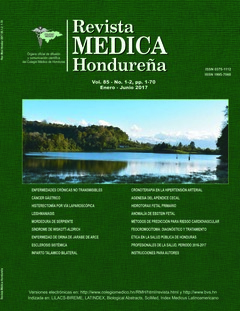Survival of Gastric Cancer in Western Honduras Pilot study: 2002-2012
Keywords:
Stomach Neoplasm, SurvivorshipAbstract
Background: Gastric cancer is the second leading cause of cancer death globally. In Honduras the incidence in the last decade was 39 and 21 per 100,000 inhabitants for men and women, respectively. In 2008 IARC (GLOBOCAN) placed Honduras as the country with the highest incidence of gastric cancer in Latin America. Methods: A retrospective cohort study of patients diagnosed with gastric cancer at the Hospital de Occidente between 2002-2012 was designed. A sample of 144 patients was selected from a total of 490 to obtain a confidence level of 95%. The data collection was obtained by verbal autopsy. Prognostic factors of survival were analyzed using Cox proportional hazards ratio models (CI: 95%), Outcomes: The male/female ratio was 2.8:1. The mean age was 63.29 years. Overall five-year survival was 9.39%. Among patients receiving dual therapy (surgery and chemotherapy), a statistically significant increase in survival was found (10.42%, p=0.048). Between the proximal (28.95%) and distal (56.58%) locations also a statistically significant difference was observed (p=0.03). There was no statistically significant difference in the macroscopic (Borrmann) and microscopic findings (Lauren). Disscusion: This study represents the first effort to estimate survival of gastric cancer in Honduras. Survival may be linked to the location of the primary lesion and the type of treatment. It is expected to develop studies with greater coverage, to answer these questions.
Downloads
390




